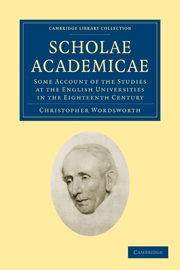 Scholae Academicae
Scholae Academicae Book contents
- Frontmatter
- PREFACE
- Contents
- CHAPTER I GENERAL INTRODUCTION
- CHAPTER II THE TRIPOS, name and thing
- CHAPTER III THE SOPHS' SCHOOLS before 1765
- CHAPTER IV ACTS AND OPPONENCIES after 1772
- CHAPTER V THE SENATE-HOUSE
- CHAPTER VI THE ADMISSION OF QUESTIONISTS. Huddling
- CHAPTER VII THE MATHEMATICKS
- CHAPTER VIII THE TRIVIAL ARTS
- CHAPTER IX HUMANITY
- CHAPTER X MORALS AND CASUISTRY
- CHAPTER XI LAW
- CHAPTER XII MODERN STUDIES
- CHAPTER XIII ORIENTAL STUDIES
- CHAPTER XIV PHYSICK
- CHAPTER XV ANATOMY
- CHAPTER XVI CHEMISTRY
- CHAPTER XVII GEOLOGY AND MINERALOGY
- CHAPTER XVIII BOTANY
- CHAPTER XIX The Degree of M.A.
- CHAPTER XX MUSICK
- CHAPTER XXI ASTRONOMY
- CHAPTER XXII CONCLUSION
- APPENDICES
- INDEX
CHAPTER II - THE TRIPOS, name and thing
Published online by Cambridge University Press: 07 September 2010
- Frontmatter
- PREFACE
- Contents
- CHAPTER I GENERAL INTRODUCTION
- CHAPTER II THE TRIPOS, name and thing
- CHAPTER III THE SOPHS' SCHOOLS before 1765
- CHAPTER IV ACTS AND OPPONENCIES after 1772
- CHAPTER V THE SENATE-HOUSE
- CHAPTER VI THE ADMISSION OF QUESTIONISTS. Huddling
- CHAPTER VII THE MATHEMATICKS
- CHAPTER VIII THE TRIVIAL ARTS
- CHAPTER IX HUMANITY
- CHAPTER X MORALS AND CASUISTRY
- CHAPTER XI LAW
- CHAPTER XII MODERN STUDIES
- CHAPTER XIII ORIENTAL STUDIES
- CHAPTER XIV PHYSICK
- CHAPTER XV ANATOMY
- CHAPTER XVI CHEMISTRY
- CHAPTER XVII GEOLOGY AND MINERALOGY
- CHAPTER XVIII BOTANY
- CHAPTER XIX The Degree of M.A.
- CHAPTER XX MUSICK
- CHAPTER XXI ASTRONOMY
- CHAPTER XXII CONCLUSION
- APPENDICES
- INDEX
Summary
‘Cry yon mercy, I took you for a joint-stool.’
K. Lear, Act iii. Sc. 6.Before entering upon the details of the university exercises and examinations, we ought to try to divest ourselves of a modern opinion, that study exists for examinations rather than examinations for study. Indeed, to apply the measure of their prevalence and efficiency to the education of past generations, would be to commit an anachronism.
We might look in vain for any public examination to justify the learning and research which in the seventeenth century made English students famous:—whose efforts were fostered, rather by the encouragement of tutors and friends, than by the disputations in the schools. Examinations in our modern acceptation there were none. As books became cheaper, the quicker and the more diligent students discovered that they could acquire knowledge for themselves where previous generations had been dependent on the oral teaching. Then arose the necessity of examination, and as this has come to be more scientifically conducted, and its results to be more public, and at last in a sense marketable, there has been a fresh demand for oral instruction.
Again, the increased use of paper and of printing, which has done much to improve and facilitate the art of examining, has in a great measure changed the character of the tripos itself.
The Cambridge tripos is a development of the eighteenth century, and its growth may be fairly taken as a sign of the vitality of Cambridge.
- Type
- Chapter
- Information
- Scholae AcademicaeSome Account of the Studies at the English Universities in the Eighteenth Century, pp. 16 - 21Publisher: Cambridge University PressPrint publication year: 2009First published in: 1877
